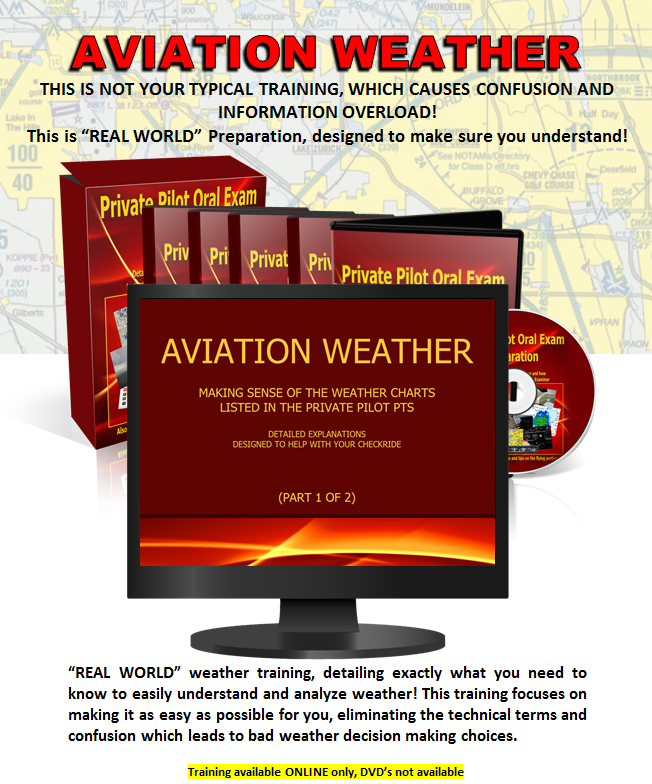by Joseph Standley | Mar 3, 2014 | All Pilots
Is aviation weather confusing you?
I know I’ve written about this before but this is an area that will kill an inexperienced pilot or student pilot and it’s just difficult to keep reading stories about this when it can be prevented. This post is really a message from my heart. I just read a post today about a guy that was extremely lucky that he didn’t die! He made a bad decision and ended up flying into IFR conditions. This is a serious issue that must be corrected before it kills more pilots!
Why are pilots making bad choices and risking their lives?
It’s inexperience and not understanding the weather. I have written articles about it and I have written e-books about it because it is a killer. If you want to fly, you MUST know and understand aviation weather. I know it’s boring and I know you want to avoid even reading any of it but many people don’t realize that they are setting themselves up for a bad situation.
Many Pilots will eventually end up caught in bad weather!
You can minimize the risk though. I’m not talking about flying only on clear days without a cloud in the sky! This is sweeping the problem under the rug and will eventually catch up with you. When it does, you better pray. If you’ve never been caught flying in bad weather then you are in for a big surprise. My suggestion to you is to learn to understand weather better.
I am not saying this to just try to sell you something (although if I wasn’t selling anything I wouldn’t be able to afford to maintain this site and I’d have to close it), but I’m telling you because there are too many fatal aviation weather related accidents that can be prevented with a little know how.
I have free tips on this site and a very inexpensive e-lesson on weather designed to make it very simple and easy for you. If you do better with video then here’s another option for you. It’s only $24. Isn’t your life worth that? It’s not like the typical hard to understand videos using technical terms that confuse you. It’s designed so you will feel comfortable making safe “GO, NO-GO” decisions. It’s about as easy as it gets.

If you don’t want to buy it, then don’t, but at least do the best you can to learn to understand the weather so you don’t end up another statistic. I really do care and if I could afford to give away everything to help you, I would. I just want to help put an end to all these terrible aviation accidents and help people the best I can. Please check out the aviation weather training here so you can continue to learn and grow into safe pilots so we can all enjoy this for many years to come.
Take care and fly safe!
by Joseph Standley | Dec 6, 2013 | All Pilots
IFR check for instrument pilots

As you know, there are certain checks above and beyond your normal VFR checks that you have to do for IFR flying. You want to be sure that your instruments are operating correctly because you will no longer be able to see out the window when flying and will be relying on them completely to control the plane.
Pitot Heat check for IFR
For your IFR instrument check you will be checking things a little closer during your preflight. How many times have you checked your Pitot heat during a VFR inspection? When flying IFR you should be sure it heats up because if you end up in icing conditions (unintentionally of course), then the pitot tube opening could get covered in ice making the airspeed indicator useless. What’s even worse is if the pitot tube and drain both get blocked. This would cause your airspeed indicator to act like an altimeter. This means that if you were to climb slightly, your airspeed would show higher. As your airspeed shows higher (faster), you would pull up slightly to slow the plane down. As you pull up, it climbs more, showing a higher speed, causing you to repeat until you get totally confused and pull it into a stall and lose control. You need pitot heat to keep the ice off the pitot tube.
Turn Coordinator / Rate of Turn check for IFR
When you turn on the master switch, listen closely because on many planes you can hear the electric gyro to the turn coordinator start to make a whining noise as it starts to spin. As you taxi, you want to be sure that your turn coordinator is moving properly too. This is your only back-up instrument for flying straight if you lose your vacuum instruments. Without it, you will not be able to tell if you are turning. You could roll upside down and not realize it until it’s too late. It’s also good for timed turns.
Compass check for IFR
Your compass should be moving freely and filled with liquid too because it will be the only thing available to tell you what heading you are flying if you lose your vacuum.
Vertical Speed (not required for IFR)
Your vertical speed should read zero on the ground but sometimes it doesn’t. If it is off, just make a mental note of where it is and make that your zero point. You can do this because it’s not even required for IFR.
Altimeter check for IFR
When setting the altimeter to the proper pressure, it should read within 75′ of field elevation or it cannot be used for IFR. Can you imagine flying in the clouds, coming in for a landing and thinking you were 75′ higher than you actually were? There will be some error but this is the cut-off.
Gyro instrument check for IFR
Your IFR instrument check also includes your vacuum gauge. Without vacuum, you have no Gyro instruments. This means that you lose your heading indicator and your artificial horizon (attitude indicator). During idle, your vacuum may not have enough suction to spin the gyros fast enough to operate the instruments properly and may even cause a low vacuum light to show up. Just bump the power up a little or double check during run-up to be sure everything is working ok. As you taxi, your heading indicator should show turns. Your main instrument for IFR flying will be your attitude indicator (artificial horizon), so what do you do if you start the plane and it looks like the image above and is not upright and erect? The answer is to give it 5 minutes. It can take 2-3 minutes for the gyros to spin up fast enough to correct the attitude indicator but it can take as long as 5 minutes per the Instrument Flying Handbook. If it hasn’t corrected itself in 5 minutes, it should be considered unreliable for IFR flight.
Electric System check for IFR
Your electric system should be charging properly so be sure to check it, because if you lose your electric you have no way to navigate except to fly a compass heading toward the nearest VFR conditions.
Clock check for IFR
In IFR flying, you need to have a clock to be able to keep track of every second, so be sure it’s working.
VOR check for IFR
Your VOR’s have to be checked, but since you can’t really check them on the ground unless you happen to be based at an airport with a ground based VOR checkpoint, you have to check the VOR’S once every 30 days and make a log of the check. I’m not going into the specifics because they can be found in the regulations but in order to file IFR, the check must be done.
Additional IFR Checks
Lastly, you want to be sure that all your pressures and temperatures are within limits and no warning lights are on. If you have carburetor heat or alternate air, make sure they are working in case you get induction icing. You should also check both your radios to be sure that you can hear them and that the frequencies are set properly. If you have a GPS, make sure the database is current.
If you have any questions that I did not answer, then please feel free to post a comment or send me an email!
Take Care
Joe
by Joseph Standley | May 9, 2013 | All Pilots, Pilots
Instrument Flying
 I haven’t been posting much recently but that doesn’t mean I’m not listening to your feedback or watching what is going on! There seems to be 3 popular subjects that I hear quite a bit about that people would like to see added to the site. One is instrument flying stuff. The site was originally designed for students or new pilots but I’ve noticed many experienced pilots visit too. Those pilots and private pilots would like to see some posts or training on instrument flying. Feel free to comment and let me know what you’d like to learn with IFR flying.
I haven’t been posting much recently but that doesn’t mean I’m not listening to your feedback or watching what is going on! There seems to be 3 popular subjects that I hear quite a bit about that people would like to see added to the site. One is instrument flying stuff. The site was originally designed for students or new pilots but I’ve noticed many experienced pilots visit too. Those pilots and private pilots would like to see some posts or training on instrument flying. Feel free to comment and let me know what you’d like to learn with IFR flying.
Real World Cross Country Training
Many pilots out there have never flown far from home because they are nervous about doing so. They’re weak in aviation weather, flight planning or navigation in general so they never leave their local area. Some are unsure of how to plan a long trip or don’t know how to handle things along the way when stopping for fuel or overnight due to weather.
I’ve been asked if I’ve thought about actually offering real world VFR or IFR cross country training. This is an internet business so I had never really thought of it but I do love flying and after thinking about it, I thought it probably would be fun to do. I do love teaching people after all. I am considering adding this to my site as an option for plane owners. I would offer either a day trip or an overnight option with detailed training covering every aspect of planning and flying cross country. I’d really like to hear more feedback before I work on adding this to see exactly what you would want to get out of it.
Flight Instructor Help
I have to say, I was very surprised to see that many of the people that have bought my flight training products are Flight Instructors. Flight instructor training is important too. As a flight instructor, you should always keep up on the latest technology and look for ways to help your students understand better. I’ve done very well and had great success with my students pass rate. There are many new flight instructors out there with limited experience that are still unsure and are looking for better ways to do things. They are still trying to figure out how to handle a certain situation or student and don’t have the experience to figure it out.
There are also older, more experienced flight instructors that don’t teach regularly and don’t know all the new regulations. They also don’t realize how tough things have gotten since they got their license many years ago. There may be experienced flight instructors that teach regularly but just can’t figure out how to get the message through to their student. Any way you look at it, instructor are always learning.
These are some of the reasons instructors are buying my flight training products. Most of the flight training materials are dry and hard to understand. I know I teach different than that. I try to make things more visual and easy to understand. I’ve had good luck with it so far. As a matter of fact, I just had an instrument student pass his check-ride yesterday and the examiner said that he was very well prepared. She said that she doesn’t see applicants come in that often that were as well prepared as my student was. I focus on what seems to work with most.
Due to all the CFI’s out there buying my stuff, I am considering putting together a coaching program of some kind to help you with real world flight instructor training. It won’t be the same old boring FAA technical stuff. It will be designed to help you pass all your student with no problem. They will be better, safer pilots because of it and the examiners (yes, even FAA) will love you for how well you prep your students. If you’re as tired as I am of all the poor pilots being put out there, then my goal is to help you make a difference. I’d love to hear from flight instructors, whether this is something you’d be interested in. This would be a very time consuming project to work on but if you guys really want it, I’d put something together and I’d try to keep the cost as reasonable as I could.
Please let me know what you think!
Joe
by Joseph Standley | Apr 18, 2013 | All Pilots
We just hit 1000 likes on our facebook page!
I know it doesn’t seem like much when you compare it to how many people are visiting this site but it seems like just yesterday that I only had 12 pilot friends there. Stop over and give us a “like” if you haven’t already!

Hmm, I didn’t notice that part of my image was blocked when I took this picture and I can’t retake it now because I already got 2 more likes in the past 5 minutes so it won’t show an even thousand. I admit, I’m a perfectionist but showing 1000 even is more important and I will lose less sleep over it. 😉
Thank you pilots for your support.
Joe
by Joseph Standley | Apr 4, 2013 | All Pilots
Are you a member of The Mile High Club?
Here’s a story from a person who thought he was finally a member.
For those of you that don’t know what The Mile High Club is, be sure you understand it before you talk about it! One of our readers posted this on our facebook site and it put a smile on my face that I couldn’t wipe off for awhile. I thought you would enjoy it so he allowed me to post it here for you to enjoy too! Leave comments below this post.
True life story written by Jake Williams
I didn’t know what the mile high club was. I had heard of it and thought it was when you went up to an altitude of 1 mile off the ground. I took flight lessons at the same time I was going through A & P School. I showed up the next day to school after my second flight lesson (in which we went up to an altitude of 6000 feet and did spins and hammer heads, my flight instructors way of introducing me to a bit of fear for aviation because prior to that lesson I had none) and told my fellow students I was now in the mile high club.
The second I said it I instantly had an audience of my fellow mechanic students wanting to hear the story. My friend asked me “how did this happen?” Remember I had no clue what the club was except to go 5280 feet off the ground. I told him innocently, “I showed up at the flight school and paid 60 bucks and the next thing I know I am in the club” At this point I have a larger audience as you can imagine. They were shocked at my reply and another guy asked, “was this your first time?” I said, “Yes it was my first time in a small airplane, of course I have been in the club every time I fly Delta or another large airline.”
Another friend asked, “What did you do up there?” I replied, “We did all sorts of maneuvers, we were even upside down for a bit, it was so much fun, my instructor said we would incorporate this stuff into future lessons as well.” (again talking about the spins, rolls etc.) By this point my friends are incredibly amused and laughing in shock and disbelief.
Another guy asked, “So what did this girl look like?” I said, “No my flight instructor is a “he” not a “she”, and his name is Kyle.” Now my buddies are laughing their butts off at me. The professor had walked into the class by this point as we were on a short break and he had half heard the conversation. He asked, “How much did this instructor charge for all this again?” I replied, “60 bucks but honestly for what you get, it is a great deal. He is a good instructor and I feel like he offers a great value for what he gives you.” Now the entire class including the professor are falling over laughing. I can’t figure out why.
Well they kept asking more questions and eventually figured out I had no clue what the mile high club was. Finally a friend clued me in and told me the real meaning of the club. Which to my horror was only partly about being a mile off the ground. To this day when I bump into those guys around town they still make fun of me. Funny story, but sure was embarrassing at the time.
by Joseph Standley | Apr 3, 2013 | All Pilots
Flight Instructors, are you having problems teaching or need guidance or advice from an experienced flight instructor to help you using real life flight training experience and not just FAA textbook stuff?
Student Pilots, are you struggling to understand and searching for the information that will make sense of it all? Are you feeling overwhelmed and wondering if you’ll ever be able to get your private pilot license?
If you have flight training questions or comments, let me know! I want to give you good information. I want to write about what you want to read. It makes it hard without feedback. There are a lot of people visiting this site and only a handful that communicate. You can comment on any of my posts so that others may learn from your questions. Many send emails but if you use the comment section under each post then it will give others more to read and learn about.
Student Pilots:
Are you a student pilot struggling to understand something?
Do you not understand what your instructor is trying to tell you?
Are you looking for an easier way to remember things?
Are you unsure how to prep for your private pilot checkride?
Flight Instructors:
Are you a new CFI and not sure how to get started?
Do you have problems communicating your message to your students?
Have you run into a problem with a student that you don’t know how to solve?
Do you struggle making things easy to understand?
Not sure how to prep private pilot students or how to use scenario based testing?
Do you know how to prep a student pilot for their private pilot checkride?
I’m open to pilots too that may have questions. I just need your feedback so I know what you guys want.
I look forward to hearing from you.
Take Care,
Joe



 I haven’t been posting much recently but that doesn’t mean I’m not listening to your feedback or watching what is going on! There seems to be 3 popular subjects that I hear quite a bit about that people would like to see added to the site. One is instrument flying stuff. The site was originally designed for students or new pilots but I’ve noticed many experienced pilots visit too. Those pilots and private pilots would like to see some posts or training on instrument flying. Feel free to comment and let me know what you’d like to learn with IFR flying.
I haven’t been posting much recently but that doesn’t mean I’m not listening to your feedback or watching what is going on! There seems to be 3 popular subjects that I hear quite a bit about that people would like to see added to the site. One is instrument flying stuff. The site was originally designed for students or new pilots but I’ve noticed many experienced pilots visit too. Those pilots and private pilots would like to see some posts or training on instrument flying. Feel free to comment and let me know what you’d like to learn with IFR flying.